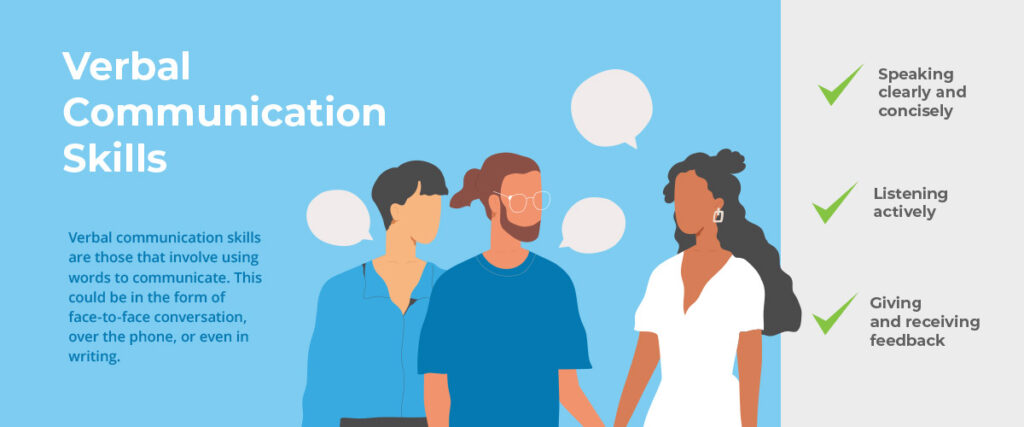When writing a resume, most of us assume that employees only care about the hard skills. What software can we use? What processes do we know? What machines can we operate?
Believe it or not, though, 61 percent of employers consider soft skills to be equally important when making hiring decisions.
Perhaps the most important soft skill is communication. Why? Because without strong interpersonal communication skills, it’s impossible to build relationships, resolve conflict, and achieve common goals.
Here’s the 101 on what communication skills are, how to include them on your resume, and which ones employers are looking for the most.
Note: You can take the guesswork out of creating your resume by using a tool like Jobscan’s resume scanner. It uses the latest AI technology to analyze your resume and provide you with a score. Increase your score to get more job interviews.
Table of Contents
- What are the best communication skills to put on your resume?
- What are communication skills?
- Why you need communication skills
- Different communication skills to highlight on your resume
- The top 5 communication skills employers look for
- Who needs communication skills?
- Developing communication skills for future jobs
What are the best communication skills to put on your resume?
Here are the top five communication skills you should consider adding to your resume:
- Active listening
- Empathy
- Confidence
- Friendliness
- Clarity and directness
Adding these communication skills to your resume can increase your chances of getting a good job.
What are communication skills?

The term “communication skills” is an umbrella phrase that covers a wide range of abilities, from verbal to nonverbal communication.
Some of the most common communication skills include:
- Active listening
- Clear and concise writing
- Public speaking
- Persuasion/negotiation
- Emotional intelligence
As you can see, there’s more to being a good communicator than first meets the eye. Employers want to know that you have the ability to not only communicate your own ideas but also understand and respond to the communication of others.
Why you need communication skills
So, why are communication skills so important? Let’s take a look at some of the key reasons:
- Communication is how we build relationships – Strong communication skills are essential for maintaining positive relationships with co-workers, customers, and clients.
- Communication allows us to resolve conflict – When conflict arises (and it will), being able to effectively communicate with those involved is crucial for finding a resolution that everyone can live with.
- Communication lets teams achieve common goals – In order to work together to achieve common goals, we need to be able to communicate effectively with one another.
- Communication is how we give and receive feedback – Feedback is a crucial part of growth, both professionally and personally. Strong communication skills are necessary for giving feedback that is clear, concise, and helpful as well as being able to receive feedback gracefully.
Communication skills touch on all aspects of our professional and personal lives. They’re essential for building positive relationships, resolving conflict, working together as a team, and continuing to grow and develop.
Different communication skills to highlight on your resume
Communication skills can be divided into two main categories: verbal and nonverbal communication. Let’s take a closer look at each one.
Verbal communication skills

Verbal communication skills are those that involve using words to communicate. This could be communicating in the form of face-to-face conversation, over the phone, or even in writing.
Some verbal communication skills examples include:
- Speaking clearly and concisely – Employers are looking for candidates who can communicate their ideas in a clear and concise manner.
- Listening actively – Active listening is a key communication skill that involves not only hearing what the other person is saying but also taking the time to understand and process it.
- Giving and receiving feedback – This is an important part of communication, and one that employers will be paying close attention to.
Verbal communication is often what people think of first when they think of communication skills. But remember, there’s a whole other side to the story!
Nonverbal communication skills

Did you know that more than 70 percent of our communication takes place nonverbally? Some experts even estimate that as much as 93 percent of communication is nonverbal.
Nonverbal communication is any type of communication that doesn’t involve using words. This could be body language, facial expressions, tone of voice, or even the way we dress.
Some nonverbal communication skills examples include:
- Reading body language – Being able to read and understand the nonverbal cues of those around us is a key part of effective communication.
- Using facial expressions – Our facial expressions can communicate a lot about how we’re feeling, even when we don’t say a word.
- Maintaining eye contact – Without eye contact, it can be difficult to build trust and rapport with others.
So, there you have it – some of the most common communication skills to be aware of.
But what specific skills or abilities are employers looking for in an interview? How can you explain your communication skills on your resume?
The top 5 communication skills employers look for
1. Active listening
It’s not enough to simply hear what somebody is saying in the workplace – you need to be able to understand and process it too. Active listening involves taking in the whole message, not just the words, and responding accordingly.
Employers want to see that you can:
- Listen to and understand what people are saying.
- Give your full attention to the speaker.
- Ask questions to clarify information.
- Summarize or repeat back what has been said.
- Show that you’re engaged in the conversation.
To show that you have active listening skills on your resume, try to include examples of times when you’ve used them in the workplace. This could be anything from leading a team meeting to resolving a conflict with a coworker.
2. Empathy
Employers are more eager than ever to find emotionally competent employees. Empathy is the ability to understand and share the feelings of another person.
Some ways to show empathy in the workplace include:
- Being aware of other people’s feelings and perspectives.
- Listening with patience and understanding.
- Responding with sensitivity and compassion.
- Asking questions to clarify someone else’s experience.
- Avoiding making assumptions about others’ feelings.
- Never talking down to someone.
If you want to highlight your empathy skills on your resume, try to include examples of giving constructive feedback or supporting a coworker through a difficult time.
3. Confidence
A good communicator is someone who is confident in themselves and their abilities. This doesn’t mean being cocky or overbearing, but rather having a healthy sense of self-assurance.
Some ways to show confidence in the workplace include:
- Standing up for yourself and your beliefs.
- Speaking up in meetings and group discussions.
- Sharing your ideas and opinions openly.
- Being assertive without being aggressive.
- Accepting feedback gracefully.
To demonstrate your confidence on your resume, you might highlight a time when you gave a presentation or took charge of a project.
4. Friendliness
This might seem overly simple for a resume soft skill, but you’d be surprised how many job applicants come across as cold or unapproachable.
Being friendly is an important part of building strong workplace relationships, and it’s a quality that employers value.
Some ways to be more friendly in the workplace include:
- Greeting people warmly when you see them.
- Offering help or assistance when you can.
- Asking questions about others’ interests and hobbies.
- Taking an interest in new coworkers.
- Celebrating birthdays and workplace milestones.
Remember, employers want to see your humanity, not just your higher education or long list of talents.
5. Clarity and directness
This is another soft skill that’s often overlooked but is very important in the workplace. Being able to communicate clearly and directly is essential in any work environment, especially when it comes to giving or receiving instructions.
Some ways to be clear and direct in your communication include:
- Speaking in a clear, concise manner.
- Using “I” statements.
- Avoiding ambiguity or vagueness in your language.
- Giving specific examples to illustrate your point.
- Asking for clarification if you’re unsure about something.
- Listening carefully to ensure you understand what’s being said.
Clear communication is a key part of any successful workplace, so make sure it’s included on your resume with the rest of your work related skills.
Who needs communication skills?
Just about everyone! Effective communication is a fundamental skill that transcends industries and job roles.
Skills such as clear and effective communication are vital for numerous professions. A software engineer’s skills should include it, just as much as it’s essential among nursing skills. It’s also a key teacher skill, since they have to be able to explain complex ideas to students. Similarly, financial analyst skills include the ability to clearly interpret and present data. Even a project manager’s skills are incomplete without effective communication.
Developing communication skills for future jobs
If you’re reading the communication skills examples listed above and feeling a little lost, don’t worry. These skills can be learned and developed over time. The key is to start practicing now so that you can be prepared for future opportunities.
Here are a few suggestions for developing your communication skills:
1. Join a Toastmasters club: This organization helps its members improve their public speaking and leadership skills.
2. Take a class: Many community colleges offer adult education classes on topics like effective communication, business writing, and public speaking.
3. Get a mentor: Ask a friend, family member, or trusted coworker to help you improve your communication skills. They can give you feedback and offer suggestions for improvement.
It’s never too late to start developing your people skills. By taking the time to improve these important abilities, you’ll be better prepared for success in your future career.
Adding these skills to your resume will help you land more interviews. But if you want to take your job search to the next level, try a tool like Jobscan’s resume scanner. It uses the latest AI technology to analyze your resume and provide you with a score.
More expert insights on this topic:





















